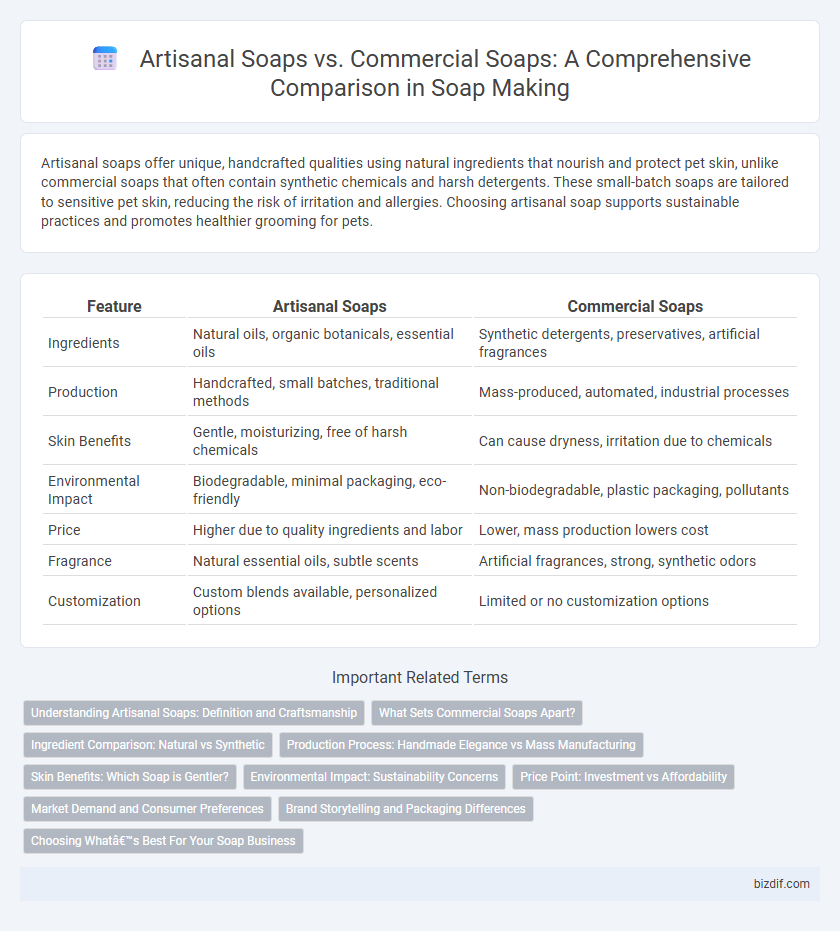Artisanal soaps offer unique, handcrafted qualities using natural ingredients that nourish and protect pet skin, unlike commercial soaps that often contain synthetic chemicals and harsh detergents. These small-batch soaps are tailored to sensitive pet skin, reducing the risk of irritation and allergies. Choosing artisanal soap supports sustainable practices and promotes healthier grooming for pets.
Table of Comparison
| Feature | Artisanal Soaps | Commercial Soaps |
|---|---|---|
| Ingredients | Natural oils, organic botanicals, essential oils | Synthetic detergents, preservatives, artificial fragrances |
| Production | Handcrafted, small batches, traditional methods | Mass-produced, automated, industrial processes |
| Skin Benefits | Gentle, moisturizing, free of harsh chemicals | Can cause dryness, irritation due to chemicals |
| Environmental Impact | Biodegradable, minimal packaging, eco-friendly | Non-biodegradable, plastic packaging, pollutants |
| Price | Higher due to quality ingredients and labor | Lower, mass production lowers cost |
| Fragrance | Natural essential oils, subtle scents | Artificial fragrances, strong, synthetic odors |
| Customization | Custom blends available, personalized options | Limited or no customization options |
Understanding Artisanal Soaps: Definition and Craftsmanship
Artisanal soaps are handcrafted using traditional techniques and natural ingredients, emphasizing quality and skin-friendly properties. These soaps often incorporate unique essential oils, botanical additives, and minimal synthetic chemicals, resulting in distinctive textures and fragrances. The craftsmanship involves small-batch production, allowing for meticulous attention to ingredient sourcing and curing processes, setting them apart from mass-produced commercial soaps.
What Sets Commercial Soaps Apart?
Commercial soaps stand out due to their mass production processes, which often involve synthetic ingredients and chemical additives designed to extend shelf life and create consistent textures. These soaps typically include detergents and preservatives that enhance foaming and cleansing efficiency but may strip natural oils from the skin. Their widespread availability and lower cost are balanced by formulations that prioritize durability and uniformity over natural, moisturizing properties found in artisanal soaps.
Ingredient Comparison: Natural vs Synthetic
Artisanal soaps typically use natural ingredients such as vegetable oils, essential oils, and plant-based colorants, which provide gentle cleansing and nourishing properties without harsh chemicals. Commercial soaps often contain synthetic detergents, artificial fragrances, and preservatives that can strip the skin of its natural oils and cause irritation. Choosing artisanal soaps supports skin health by utilizing biodegradable, eco-friendly components free from parabens, sulfates, and phthalates commonly found in mass-produced products.
Production Process: Handmade Elegance vs Mass Manufacturing
Artisanal soaps are crafted through small-batch, handcrafted methods using natural ingredients and traditional techniques, ensuring unique textures and personalized formulations. Commercial soaps undergo mass manufacturing, employing synthetic detergents and automated processes that prioritize uniformity and cost efficiency over ingredient quality. The production process of artisanal soaps emphasizes artisanal elegance, sustainability, and skin-friendly properties unlike the standardized output of commercial soap factories.
Skin Benefits: Which Soap is Gentler?
Artisanal soaps typically contain natural oils, glycerin, and organic ingredients that help retain moisture and nourish sensitive skin, making them gentler than commercial soaps, which often include synthetic detergents and harsh chemicals that can strip natural oils. The moisturizing properties of artisanal soaps reduce dryness and irritation, promoting healthier skin. Dermatologists often recommend artisanal soaps for individuals with eczema, psoriasis, or sensitive skin due to their mild, skin-friendly formulations.
Environmental Impact: Sustainability Concerns
Artisanal soaps use natural, biodegradable ingredients that reduce environmental harm compared to commercial soaps, which often contain synthetic chemicals and microplastics contributing to water pollution. Small-batch production in artisanal soap making ensures minimal waste and lower carbon emissions, unlike mass production processes that rely heavily on non-renewable resources. Sustainable sourcing of fats and oils in artisanal soaps supports biodiversity and reduces deforestation, highlighting a positive environmental impact absent in many commercial soap formulations.
Price Point: Investment vs Affordability
Artisanal soaps typically carry a higher price point due to the use of premium natural ingredients, handmade processes, and smaller batch production, positioning them as an investment in skin health and eco-conscious choices. Commercial soaps are mass-produced with synthetic additives and simpler formulas, making them more affordable and accessible to a wider audience. Consumers weighing cost versus quality often find artisanal soaps justify the price through superior moisturizing properties, unique scents, and minimal environmental impact.
Market Demand and Consumer Preferences
Artisanal soaps have seen increasing market demand driven by consumer preferences for natural ingredients, unique scents, and skin-friendly formulations compared to commercial soaps, which often contain synthetic additives and mass-produced fragrances. Consumers prioritize artisanal soaps for their eco-friendly packaging and customization options, appealing to niche markets focused on sustainability and wellness. The growth of e-commerce platforms and social media has further boosted artisanal soap sales by enhancing product visibility and fostering direct connections with buyers seeking high-quality, handcrafted products.
Brand Storytelling and Packaging Differences
Artisanal soaps often emphasize brand storytelling by highlighting unique ingredients, handcrafted methods, and local sourcing, creating a personalized and authentic consumer connection. Packaging for artisanal soaps tends to use eco-friendly, minimalistic designs with natural textures and hand-labeled details that reflect sustainability and craftsmanship. In contrast, commercial soaps usually feature mass-produced, standardized packaging designed for mass appeal with bold branding and product claims focused on convenience and shelf presence.
Choosing What’s Best For Your Soap Business
Artisanal soaps, crafted with natural ingredients and unique formulations, appeal to niche markets seeking quality and sustainability, while commercial soaps emphasize mass production and cost efficiency for broader distribution. Selecting the right type depends on your target audience, brand values, and production capacity, as artisanal soaps often command higher prices but require skilled labor and premium raw materials. Balancing product differentiation and operational scalability is crucial for sustaining profitability and customer loyalty in your soap business.
Artisanal Soaps vs Commercial Soaps Infographic

 bizdif.com
bizdif.com